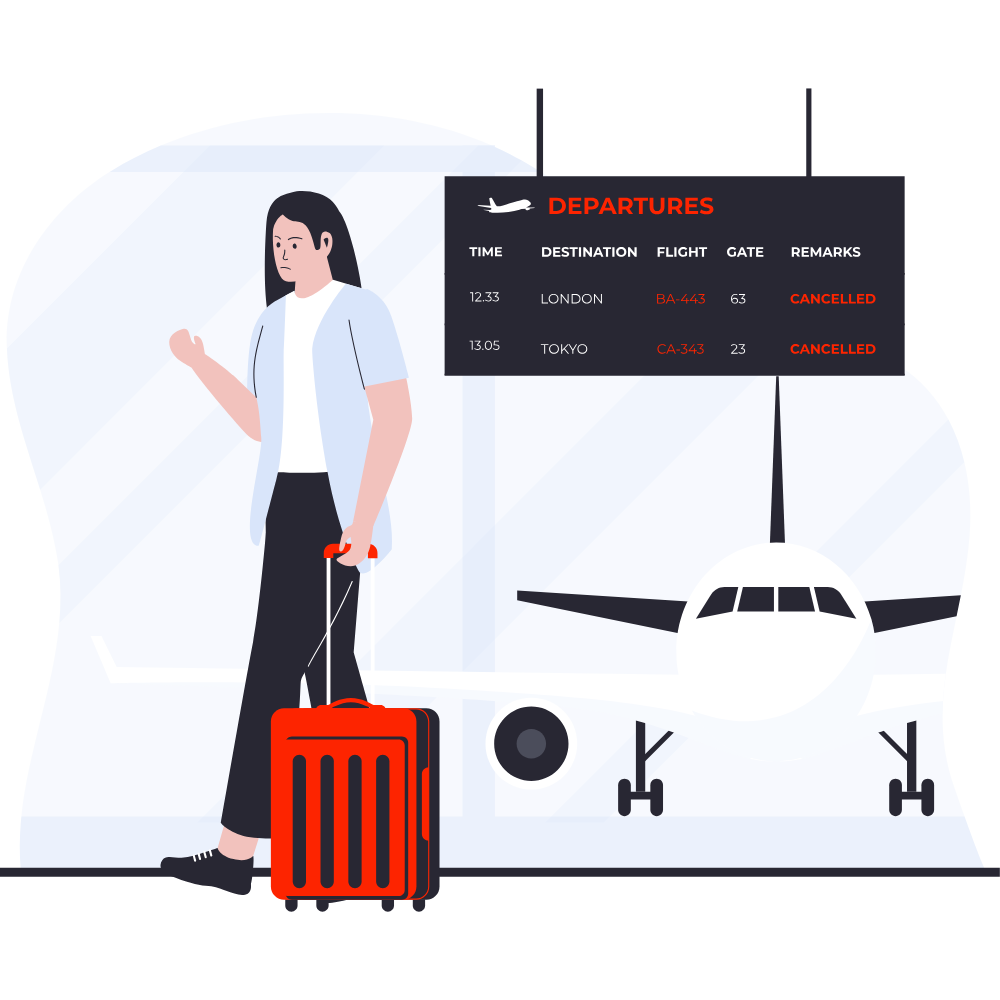The Revenue Blind Spots Library.
These scenarios represent critical moments where revenue and guest loyalty are silently won or lost at hotels every day.
What’s striking isn’t just their universality, but how few properties recognize the significant revenue left on the table by treating them as “just part of the business.”
Examine these scenarios honestly. Each represents a decisive point where your property is either gaining competitive advantage or falling behind.
These revenue triggers remain largely invisible from within daily operations—precisely why addressing them creates such significant impact.
1. The Midnight Booking Opportunity
- Category: Revenue Leakage Points
It’s 2:47 AM. Your night auditor is balancing accounts while three guests check in late from delayed flights. Meanwhile, your website visitor from Australia (where it’s daytime) is ready to book a 5-night stay but has questions about room views and cancellation policies. Without immediate answers, they’ll likely book elsewhere.
2. The Cancellation Recovery System
- Category: Revenue Leakage Points
A guest cancels their 4-night stay during peak season just 48 hours before arrival. Even though you’ve collected a cancellation penalty, the empty room still represents a missed opportunity. Spontaneous demand for those dates has significantly decreased so you’re finding it hard to resell that room. The result: a premium room remains empty for four nights during high season despite numerous clients who had previously shown interest in those dates but couldn’t find availability.
3. The Multi-Language Barrier
- Category: Guest Experience Friction
Natalia, a business traveler from Moscow, browses your hotel website at 11 PM looking for information about breakfast timing and gluten-free options. Though she understands basic English, she’s not confident expressing dietary requirements in a foreign language. After attempting to use your contact form in Russian, she realizes she won’t get a timely response. Frustrated, she books a competing hotel whose website provided clearer general information, though still not answering her specific questions. Your hotel just lost a 5-night business booking worth €1,450.
4. The Personalization Gap
- Category: Guest Experience Friction
A returning guest books a room but the front desk staff has no easy way to access their previous preferences (room location, pillow type, allergies, previous complaints) without manually searching through notes or past reservations, resulting in a generic rather than personalized experience.
5. The Upselling Timing Problem
- Category: Revenue Leakage Points
You try to upsell room categories, experiences, or amenities at just two points: during booking (when guests are price-sensitive and focused on the base price) or at check-in (when guests are tired from traveling and rushed to get to their rooms). Your staff follows this traditional approach because these are the only two guaranteed touchpoints, but it results in upsell success rates below 15%. Meanwhile, your premium rooms and services often remain unsold, representing a significant lost revenue opportunity.
6. The Information Consistency Challenge
- Category: Guest Experience Friction
You regularly update your hotel information (restaurant hours, spa services, local events), but struggle to keep this information consistent across your website, booking engine, printed materials, and staff knowledge. Your front desk tells guests the spa closes at 9 PM, while your website says 8 PM, and the in-room directory says 10 PM. Guests arrive at 8:45 PM to find the spa closed, leading to disappointment and negative reviews. Despite your best efforts to communicate changes to your team, outdated information persists, creating frustrated guests and putting your staff in uncomfortable situations.
7. The Pre-Arrival Communication Overflow
- Category: Operational Inefficiencies
As check-in approaches, your front desk is overwhelmed by guest inquiries about transportation, special requests, and local information across multiple channels (email, phone, messaging apps). Your team struggles to track and respond promptly to all requests, resulting in frustrated guests.
8. The In-Stay Service Bottleneck
- Category: Guest Experience Friction
During peak hours, your in-house guests call the front desk simultaneously requesting extra towels, room service, or local information. Your phone lines become congested, staff scrambles between calls, and response times increase dramatically. Guests wait 10+ minutes for simple requests precisely when they’re forming their lasting impression of your property. Some give up entirely, leading to disappointment and negative reviews about slow service.
9. The Group Booking Coordination Challenge
- Category: Operational Inefficiencies
Your team struggles when managing group bookings of 10+ rooms. You juggle dozens of emails coordinating different arrival dates, room preferences, and special requests from both the group coordinator and individual travelers. Spreadsheets become outdated quickly, details get lost in lengthy email chains, and your staff spends hours reconciling conflicting information. Despite your best efforts, group check-ins often result in misallocated rooms, forgotten requests, and frustrated guests waiting in your lobby.
10. The Review Response Backlog
- Category: Brand Reputation Management
You know that responding promptly to reviews impacts future bookings, but your management team struggles to keep up with the volume across multiple platforms (TripAdvisor, Google, Booking.com). During high season, your response time stretches to 7+ days, and you resort to generic templates that guests recognize as insincere. Negative reviews often go unaddressed for weeks, remaining visible to potential bookers without your perspective or resolution, while positive reviews miss the opportunity for relationship building.
11. The Local Knowledge Deficit
- Category: Guest Experience Friction
Your guests ask for restaurant recommendations, but the quality of advice varies dramatically depending on which staff member they speak with. New employees may only suggest obvious tourist spots, while long-time staff rely on personal favorites that might not match guest preferences. When asked about current exhibitions, seasonal activities, or less obvious attractions, your team often provides outdated or limited information. Guests return disappointed after following well-intentioned but mismatched recommendations.
12. The Flexible Dates Opportunity Loss
- Category: Revenue Leakage Points
Your booking engine forces potential guests to select exact check-in and check-out dates, even when they have flexible travel plans. A guest looking for “any weekend in May” or “a 5-night stay sometime this summer” must manually check multiple date combinations one-by-one, a tedious process that often leads to abandonment. Your system can’t accommodate natural search patterns, causing you to lose bookings from flexible travelers who would happily fill your low-occupancy periods if only they could easily identify them.
13. The Last-Minute Staffing Challenge
- Category: Operational Inefficiencies
You face an impossible staffing dilemma: schedule extra staff “just in case” (increasing costs and creating idle time during normal periods) or maintain minimal staffing and risk service delays when unexpected demand spikes occur. When multiple check-ins happen simultaneously, your front desk becomes overwhelmed, creating long wait times and poor first impressions. Meanwhile, your reservation team struggles to handle routine inquiries during these peak periods, potentially losing new bookings.
14. The Training Consistency Gap
- Category: Operational Inefficiencies
Your hotel experiences 30%+ annual staff turnover, requiring constant training of new team members. During their learning period, new staff provide inconsistent or incorrect information about hotel policies, local attractions, and service procedures. Guests receive different answers to the same questions depending on which employee they ask, creating confusion and undermining confidence in your service quality. Meanwhile, your experienced staff members spend hours repeating the same training information rather than focusing on guest service.
15. The Weather Contingency Chaos
- Category: Guest Experience Friction
When unexpected weather changes occur, your front desk is suddenly flooded with identical questions from multiple guests. “Our boat tour was canceled – what can we do instead?” “Will airport transfers be delayed?” “Is the rooftop bar still open?” Your staff scrambles to suggest alternatives while juggling calls to local tour operators and checking transportation options. Meanwhile, guests wait in line for assistance, losing precious vacation time and growing increasingly frustrated as they see their carefully planned activities disrupted with no immediate alternatives.















